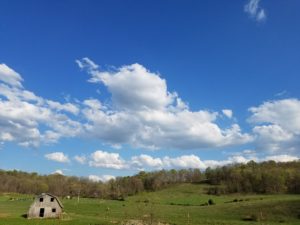Main Body
Spring

It’s the steady schluck, plop, schluck, plop of overshoes in the mud, a constant, reflexive struggle with the wet earth to place one foot in front of the other. When you were a child, you imagined the sound wasn’t that of your father’s overshoes but was instead a wayward elephant you had to follow and protect. You learned fairly quickly not to let your imagination disrupt your chores, lest your elephant-following adventures be cut short by a playful (or sometimes not so playful, depending on the length and severity of your daydreaming) swat on your behind. The row of metal clasps closing the rubber flap around each leg makes a faint clanking sound, like the rattle of a harness or the clink of a chain, but the noise is obscured when the mud is deep, overpowered by the suction resulting from each footstep. You become adept at gauging the depth of mud by the color of the ground, and you generally follow the tracks of those before you, both animal and human. To rush would be to foolishly risk sliding and falling; it is better to keep your steps deliberate and your rhythm steady.
The fences must be mended, the animals fed, the equipment maintained, regardless of the relentlessness of rain or the tiring trudge over rain-soaked ground. You know the rain is necessary, though, and at times the slopping about becomes a welcome activity as you consider what this hard, early spring storm will bring. The smell of damp livestock mingles with the sweet smell of hay when you pause to listen to the rainfall from the safety of the barn door; you switch off the barn’s lights to let the evening envelope you in its wet darkness, and for a moment you forget your soaked jeans and the swath of hair plastered to the side of your face. Even the best rain gear can’t guard you completely from a torrent such as this, and you wonder how your older relatives coped before the invention of micro-fleece and ultra-lightweight, water-shedding coats capable of keeping out one hundred mile per hour winds. One thing remains constant between you and the previous generations slogging through the elements to fulfill the day’s responsibilities: the flashes of lightning punctuating the ever-darkening sky remind you of the warm, well-lit home waiting to receive you. You make the trek back to the house as quickly as possible, slightly rushing the daily routine of checking gates and doors, making sure everything is secure for the night.
When the rains halt and the sun works its magic, it’s the bare, pungent soil teeming with the promise of life. You pause from tilling the soil to grasp a handful of cool, upturned earth not yet warmed by the sun, sifting it gently through your fingers before returning to the tasks at hand. It’s the gusts of wind, still holding traces of winter chill but decidedly hinting to the warmth of months ahead, rustling the budding trees as it incites the young livestock—and even a few of the older animals—to snort and stamp and gallop for no apparent reason. You follow a generations-old routine of preparing soil and seeds; the equipment has changed over the years, but you are still reliant on the earth and elements to work with you rather than against you. In a few short weeks you’ll see all manner of shoots and stalks, and you’ll mind each crop according to its kind. You’ll watch over the emergence of new life from both soil and beast, assisting the survival of the fittest (within good reason, of course). You can help the blind calf by affixing a bell around his mother’s neck, but there’s little you can do to help the breach foal, likely dead before it entered the birth canal, aside from giving it a solemn burial. You can do nothing to erase the killing effects of a hard, late frost except till the lifeless seedlings, now a sickly, pale green, back into the soil from which they had so eagerly sprung and portion out more seeds to be sown. The second planting takes the place of the first, and, though they are smaller than they ought to be when summer arrives, the crops remain standing.
